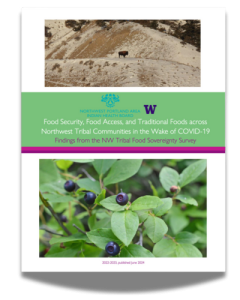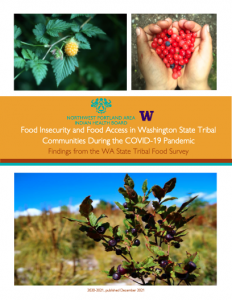Traditional Foods, Food Sovereignty, and Food Security Among Pacific Northwest Tribal Communities During and After COVID-19
The COVID-19 pandemic disproportionately affected Native communities and their main sources of economic support. Tribal reservations saw higher infection rates compared to neighboring areas, and the closure of gaming and hospitality businesses removed vital economic lifelines. Many Native communities continue to struggle in meeting basic food needs, especially in deprived and geographically remote areas of the PNW. Tribal officials, tribal health departments, and community organizations across the PNW have been working continuously to meet an ever-changing and diverse range of food needs, but data to inform this work and pinpoint need can be difficult to come by. Tribal food security may depend on the resilience of the regional food supply chains, but also on the functioning of traditional food systems (hunting, fishing, gathering) that are key to the health and sovereignty of so many Native people. The NW Tribal Food Sovereignty Coalition (NTFSC) and the Northwest Tribal Epidemiology Center (NWTEC), both housed within the Northwest Portland Area Indian Health Board (NPAIHB), have worked with the UW Food Systems, Nutrition, and Health team to develop unique culturally and regionally relevant instruments to define and measure different aspects of food access, food security, food sovereignty efforts, and traditional foods engagement across PNW Native communities during and in the wake of COVID-19.
Project Goals and History
NWTRIBAL (Wave 2)
The second wave of research (known as NWTRIBAL) began in November of 2021, closely mirroring the methodology of the earlier WATRIBAL work, but expanding the geographic area of focus to encompass most of the PNW (Idaho, Oregon, and Washington). Work began with another series of key informant interviews that again asked for guidance and input on the development of a second online, quantitative survey. Whereas WATRIBAL focused heavily on identifying immediate need in the middle of the COVID-19 emergency, NWTRIBAL broadened the scope of research. In addition to assessing immediate need, the second survey attempted a deeper look at food sovereignty efforts, traditional foods access and engagement, and recovery efforts in the wake of COVID-19. The NWTRIBAL survey was fielded via similar channels as the earlier WATRIBAL survey, and was active from August 2022 through May of 2023. Results were again analyzed and compiled into a comprehensive report and list of recommendations shared across PNW Native communities and other relevant entities.
The PNW continues to recover and adapt in the aftermath of COVID-19, and the region continues to contend with the historical and contemporary oppression of Native people. The NWTRIBAL team hopes to carry out future iterations of the project, providing further insight regarding food and health needs, and continuing to support the great and beautiful diversity of food-related work being undertaken by PNW Native communities.
WATRIBAL (Wave 1)
This project was originally launched in September 2020 to assess and ultimately help address the food needs of Native communities in WA State at the height of the COVID-19 pandemic. The first wave of research (known as WATRIBAL) involved a series of key informant interviews with tribal officials and food and health leaders to help guide the development of an online, quantitative survey. The quantitative survey was developed in partnership between NPAIHB and UW, relying heavily on the knowledge and expertise shared by interviewees. A final survey, open to all self-identifying Native residents of WA and all descendants of WA tribes who were over the age of 18, was fielded in March and April of 2021 through a mix of direct outreach, the help of a wide variety of tribal entities across the state, and via social media. Results were analyzed and compiled into a final report shared widely among tribal governments, tribal health departments, traditional foods programs, and many other entities. Results were utilized to help target response efforts to COVID-19’s impacts on the wellbeing of Native communities.
WATRIBAL Survey (Wave 1)
Sponsor
University of Washington Population Health Initiative
Project Team
- Lead Investigator: Jennifer Otten, PhD, RD, Associate Professor, UW School of Public Health, Department of Environment and Occupational Health Sciences & Food Systems Director, Center for Public Health Nutrition
- Victoria Warren-Mears, PhD, RDN, FAND, Director, Northwest Tribal Epidemiology Center, Northwest Portland Area Indian Health Board
- Nora Frank-Buckner, MPH, Food Sovereignty Initiatives Director, Northwest Tribal Epidemiology Center, Northwest Portland Area Indian Health Board
- Brinda Sivaramakrishnan, MPH, Professor, Tacoma Community College
- Laura Lewis, PhD, Professor, Community and Economic Development, Washington State University
- Adam Drewnowski, PhD, Professor, UW School of Public Health, Epidemiology, Center for Public Health Nutrition Director
- James Buszkiewicz, MPH, PhD, Research Scientist
- Chelsea Rose, PhD, Research Coordinator
- Esther Nguyen, MSc, Research Study Coordinator
- Alan Ismach, Research Coordinator
Project Period
9/1/20-12/31/21
NWTRIBAL Survey (Wave 2)
Project Sponsor
Project Team
- Lead Investigator: Victoria Warren-Mears, PhD, RDN, FAND, Director, Northwest Tribal Epidemiology Center, Northwest Portland Area Indian Health Board
- Shoshoni Walker, MS, Food Sovereignty Initiatives Project Manager, Northwest Portland Area Indian Health Board
- Luca Green, Tribal Food Systems VISTA Volunteer, Northwest Portland Area Indian Health Board
- Jennifer Otten, PhD, RD, Associate Professor, UW School of Public Health, Department of Environment and Occupational Health Sciences & Food Systems Director, Center for Public Health Nutrition
- Sofia G. Ayala, PhD, Research Scientist, UW Center for Studies in Demography and Ecology; Executive Director, Northwest Federal Statistical Research Data Center; Director, UW Data Collaborative
- Emilee Quinn, MS, RD, Former Research Scientist, Food Systems, Nutrition, and Health, Department of Environmental and Occupational Health Sciences, UW School of Public Health
- Alan Ismach, Research Coordinator, Food Systems, Nutrition, and Health, Department of Environmental and Occupational Health Sciences, UW School of Public Health
Project Period
11/1/21-05/31/24
Project Status
Active
Project Contact
Alan Ismach, ismaca@uw.edu
- Pandemic disrupts food access for tribal communities
- Survey shows disproportionate food insecurities in Washington tribal communities
- Survey of Washington state tribal communities illustrates how pandemic has exacerbated food disparities
- Collaborating for health equity
- School awarded six COVID-19 population health equity grants

